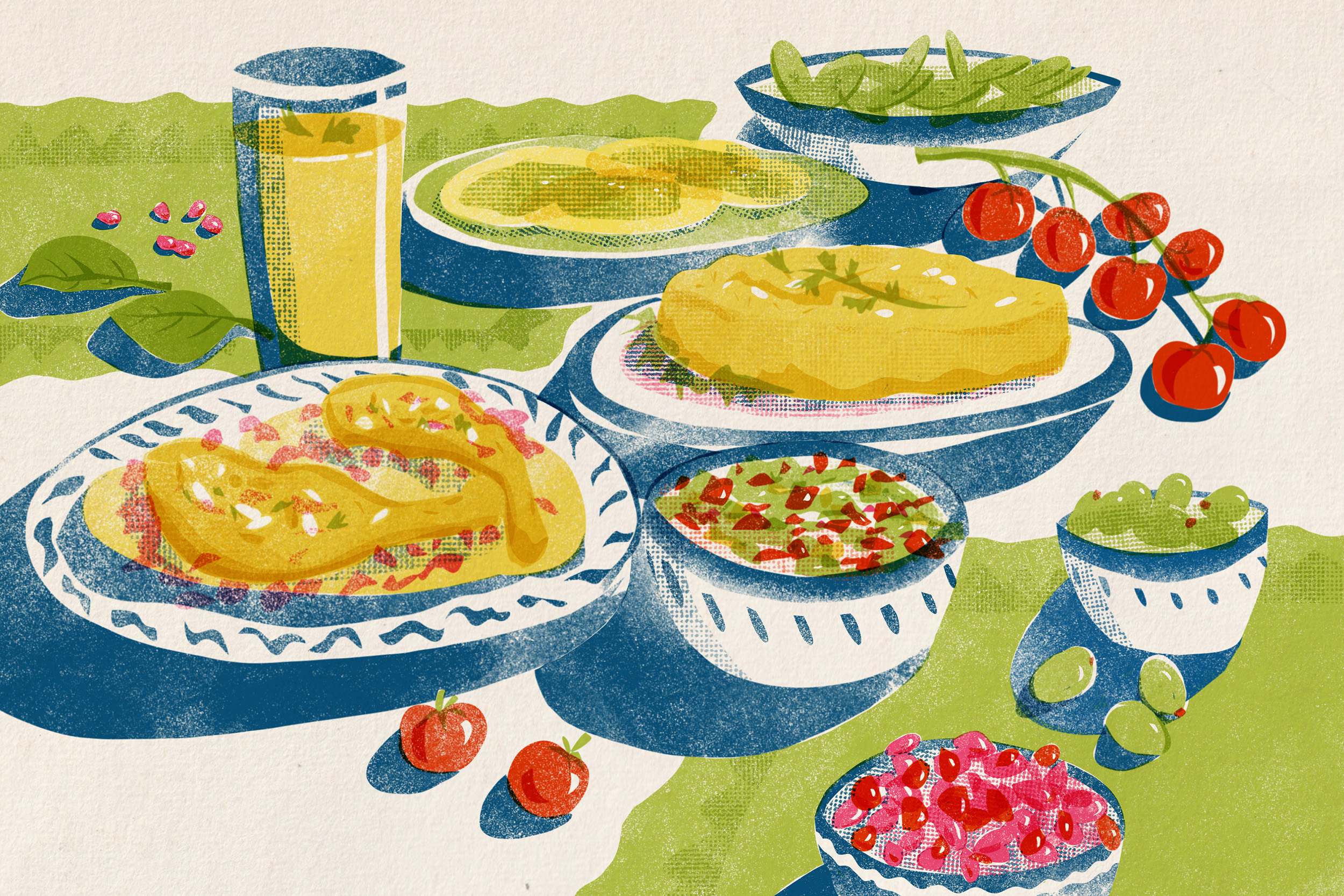In the heart of the Middle East, where the echoes of community and conflict have resonated for centuries, there is a cuisine that stands as a testament to the strength and resilience of a people. A tapestry woven from the flavors of a storied land, Palestinian cuisine carries the heart of a culture that has endured hardships, both ancient and contemporary. In the shadows cast by the ongoing brutality in Gaza, the light of Palestine shines through in Palestinian culture. It is not in the nature of Palestinians to suffer, but to find happiness and contentment, to forge community and bring people together— to share meals, time, and love. Their culinary tradition mirrors the warmth of a shared table and the unwavering determination of a culture– a story of joy amongst adversity, of family amongst fragmentation.
Each dish is a flavorful ode to history and an invitation for you and I to partake in Palestinian joy, to remember struggle must not define the people who have always been more than the conflict that characterizes their grief.
Palestinian cuisine, as explained by Palestinian chef Fadi Kattan in BBC’s Good Food, comes directly from what the land can offer. It’s an extremely seasonal cuisine, ranging from sweet summertime dishes to rich savory platters. Little is imported, so a majority of Palestinian cuisine is directly sourced from hyperlocal farms, which furthers the influence of the agriculture of the land and its direct relation to Palestinian cuisine.
Not only does the agriculture of the land influence the cuisine, but the relative location can also change what local delicacies are available. The Institute for Middle East Understanding explains the variances in Palestinian cuisine, citing coastal regions relying much more on the use of seafoods such as fish as well as vegetables, in comparison with the more interior regions, which center goat as their main source of protein. In the north, closer to Lebanon, many dishes incorporate yogurt-based sauces, oftentimes from a reconstituted dry yogurt, such as kishk or jameed.
Food in Gaza is often characterized by piquancy, a pleasant display of vibrant greens and dried red hot peppers, with influences from Egyptian cuisine. Central and southern regions prefer tomato-based sauce, but what ties all of these variances together is the importance of these meals to social gatherings, characterized by the spread of food. Enough to share and always cooked to serve many, including any guests who may pop in unannounced, Palestinian cuisine and culture promote a unity within communities over shared delicacies.
Knafeh is just one of the many incredible Palestinian dishes. A pastry, rolled in mild white cheese, then caramelized in honey syrup, with sprinkled pistachios on top. Often eaten alongside black coffee or tea, knafeh is enjoyed as a dessert or especially sweet breakfast. The dish is primarily a combination of both mozzarella and sweet cheese, making for an incredibly delicious bite with long strands of melted cheese pulling out of the pastry. A sweet, salty dish, some even refer to knafeh as Palestine’s cheesecake.
Musakhan is a more savory dish in Palestinian cuisine, which calls for a combination of olive oil, sumac (which is a dark and lemon flavored spice), caramelized onions, and roasted chicken. The exact recipe of musakhan varies from household to household but more often than not, the chicken is poached and then roasted separately. Almonds or pine nuts are sprinkled on top of the taboon (or flatbread) for a hearty bite. The term taboon for these flatbreads comes directly from the term referring to the freestanding ovens in the villages which produce them. Palestinian chef Kattan further explains that Musakhan is generally regarded as a national dish for Palestinians.
Maftoul, or giant couscous, is another well-loved Palestinian dish. Traditionally, maftoul is made by women who come from the villages and roll bulgur wheat in whole wheat flour. This is then simmered in stew with onions and peppers, or served alongside a hearty serving of roasted chicken to make for an incredibly delicious meal.
The importance of olives to Palestinian cuisine cannot be understated. Referred to as zaytoun, olives in Palestinian cuisine come from Canaan, near Burqin, where jade green hills host olive trees dating around 3,000 years. These ancient groves are not only sustainable, with no use of pesticides, but are renowned: both Rumi and Nabali olives are very well known for their incomparable taste.
These Palestinian dishes are often followed by sugar sweet fruits from the harvests of Palestinian farmers. These fruits include grapes, peaches, figs, plums, persimmons, citrus, and mulberries. In early spring, Palestinians indulge in tart, crispy plums, which sweeten later in the year. Almonds are also harvested prior to being ready, and the green husk is eaten alongside the almond, oftentimes dipped in salt.
No matter what finds its way on the table, it’s clear food is more than simply nourishment for the Palestinian culture. Many incredibly tender moments, including weddings, funerals and birthdays, are celebrated and characterized by full spreads of food to bring the community together over a shared bite, whether that be a hearty dish like musakhan, or a platter of freshly cut pink figs to dine on, Palestinians share their heritage and love through the dishes they make.
It’s a love letter to the stomach and the land: a cornucopia of Palestinian treasures, seared and simmered, grilled and baked into dishes to be shared with friends and family around the table. The indomitable spirit of the Palestinian people has persevered for decades, and it is carried in their voices, souls and in their food.
Let us not forget that Palestinian culture is a celebration of life, a testament to the enduring spirit, and a reminder that the pursuit of happiness can be a profound act of resistance. Just as these flavors have transcended borders and barriers, so too should our understanding of this culture extend beyond the confines of conflict, acknowledging the humanity, love and warmth that truly characterize the heart of Palestinians.

















